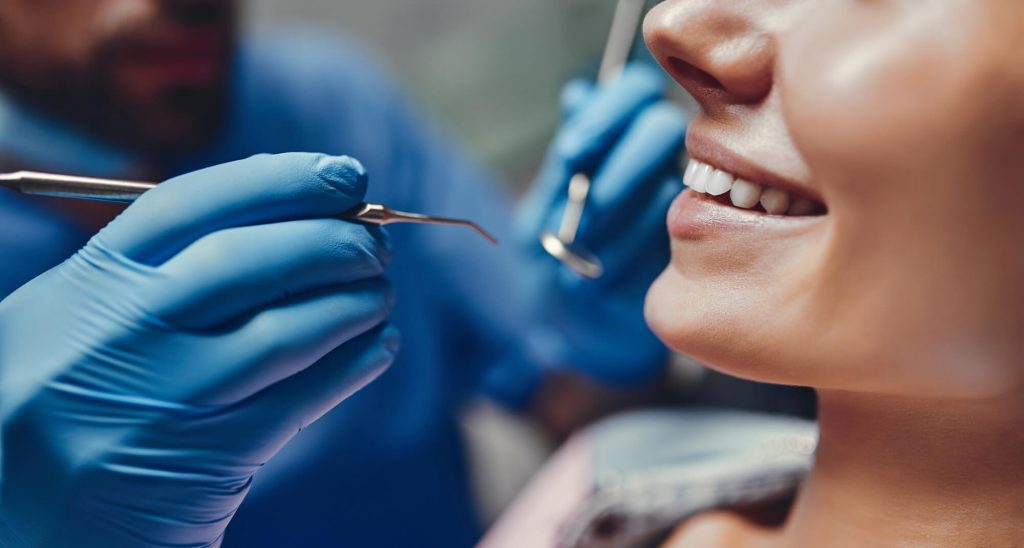Are you one of those people who are skeptical about visiting a dentist in Clayton? Surprisingly, many people don’t see the value of dental checkups. They only see the need for a consultation when they are already experiencing dental troubles. One of the leading oral health problems today is gum disease.
Gum disease is a condition that affects men and women. However, statistics show that it’s more common in men. According to the latest CDC report, 47.3% of American adults 30 years old and above suffer from gum disease. It appears the condition is more prevalent the older you get. The good news is that it can still be reversed as long as the condition is detected and treated early.

Understanding the Different Stages of Gum Disease
What Are the Stages of Gum Disease?
Early Signs
It can be hard to detect early signs of gum disease because your gums will feel and look normal. There are no signs of irritation or swelling. But, they may occasionally bleed when biting into hard foods.
However, this does not immediately mean that you have gum disease. The best way to find out is to see your dentist. An oral exam will help determine if you suffer from early-stage gum disease.
Gingivitis
Early-stage gum disease is known as gingivitis. The signs pointing to gingivitis are already evident, such as plaque buildup along the gumline. If your gums are bleeding more often, it’s likely because of plaque and tartar that have accumulated in the area where your teeth and gums meet.
It’s also possible to see a white milky discharge known as exudate. Luckily, when gingivitis is caught early, your dentist can still reverse it. You should brush and floss daily and schedule routine teeth cleanings to prevent gum disease.
Early Periodontitis
What happens if you don’t address gingivitis? Unfortunately, without treatment, gingivitis will not resolve on its own. It will only advance into early-stage periodontitis or periodontal disease. In this stage, your gums are inflamed, feel sore and have a pale color. The plaque will also start to calcify, causing more damage to your gum tissues. At this point, your jawbone will begin to weaken and result in tooth loss.
Moderate Periodontitis
In this stage, the disease is getting worse. You will notice a significant change in your gum tissues as they start to recede. As gum recession progresses, your teeth become vulnerable to damage and decay.
Your teeth will also start to become wobbly and shift out of position. It will only be a matter of time before they fall out. The discharge will also be more frequent, and you’ll experience an odd taste in your mouth. When you exhibit these symptoms, infection is already present, and your oral health is at stake.
Advanced Periodontitis
Once gum disease has reached the advanced periodontitis stage, your gums will look significantly smaller, and your teeth will appear visibly large. By this time, many of your teeth will feel loose, even those that look healthy. This is because the bacteria is now destroying your jawbone. If you don’t seek treatment, tooth loss is imminent.
How Is Gum Disease Treated?
Treatment can be done by a dental hygienist, a dentist, or a periodontist. The goal of the treatment is to clean the gum pockets around your teeth to prevent further damage. However, one of the most critical factors contributing to a successful treatment is practicing good oral care at home. You should also make certain lifestyle medications to speed up the healing process.
Nonsurgical Treatments
For early-stage gum disease, your dentist will opt for non-invasive treatments such as the following:
- Scaling and root planing – Scaling is a procedure that involves removing bacteria and tartar from the surface of your teeth and the areas underneath your gum tissues using an ultrasonic device or a laser. Root planing is smoothening your tooth roots to prevent bacteria from clinging to them. It also removes bacterial byproducts that are causing inflammation and delays in healing.
- Antibiotics – Your dentist may prescribe oral or topical antibiotics to stop bacterial infection. Oral antibiotics come in pills or tablets, while topical antibiotics include gels and mouth rinses.
Surgical Treatments
For patients with advanced periodontitis, your dentist may suggest surgery such as the following:
- Pocket Reduction Surgery or Flap Surgery – A small incision is made in your gum tissues to allow your dentist to lift sections of your gums back to expose the tooth roots. This allows for more efficient scaling and root planing. Since periodontitis leads to bone loss, parts of your bone may be reshaped before the gum tissues are stitched in place. Once healing has taken place, it will be easier for you to clean the area and maintain healthy gums.
- Soft Tissue Grafts – As you lose gum tissues due to recession, your dentist will have to make reinforcements. This can be done by taking small tissues from your palate (the roof of your mouth) or getting tissues from other sources and attaching them to the affected site to help minimize gum recession.

Do You Need a Dentist in Clayton?
Are you unsure about your gum health? If yes, we can help you. At Tyron Family Dentistry, your oral health is our priority. We offer an extensive array of treatments that will help restore and maintain your dental health. Contact us today for an appointment.

